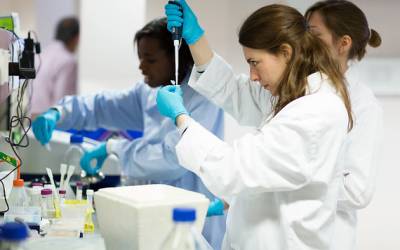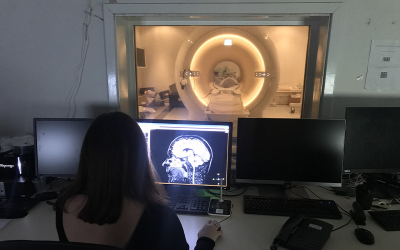Dementia
Dementia is the greatest scientific, medical and socio-economic challenge of our times. According to the World Health Organization over 55 million people have dementia worldwide. This is predicted to triple, rising to over 150 million by 2050.
What is dementia?
Dementia is a group of symptoms caused by different diseases that damage the brain. It is a progressive condition which can affect memory, language and behaviour. Currently there is no cure.
While Alzheimer's is the most common type of dementia, there are others such as vascular dementia, frontotemporal dementia, Parkinson's and Huntington’s disease. There are also rarer forms of dementia caused by other diseases and conditions.
Some people develop multiple types of dementia; this is known as mixed dementia. It is also possible for a younger person to develop dementia. When a person develops dementia before the age of 65, this is known as young-onset dementia.
Dementia: a UCL priority
UCL can lay claim to world-leading expertise across the spectrum of research, from genetics to evidence based treatments and support for patients and carers. We have both the ambition and ability to make a difference and meet the challenge of this most pressing of global public health problems.
The UCL Dementia Research Centre is a hub for patient-centred research into dementias. As well as clinical studies and trials in Alzheimer’s disease and other common causes of dementia, we have particular expertise in young-onset, inherited and unusual dementias.
We are also home to the national headquarters of the UK Dementia Research Institute (UK DRI), which is the single biggest investment the UK has ever made in dementia, primarily supported by the Medical Research Council, Alzheimer’s Research UK and the Alzheimer’s Society.
Our new purpose-built centre of excellence for UCL neuroscience will support the transformation of the national dementia effort by bringing together researchers, clinicians and patients, building on our unparalleled research strength in clinical and basic neuroscience to accelerate the discovery of treatments.
Meeting the challenge

Our pioneering researchers will develop drugs that slow down or stop the disease.

We will develop preventative measures that will reduce dementia prevalence.

We will develop new models of care, working with our hospital and primary care partners.
Over the last three decades there has been remarkable progress in understanding the human brain and the biology of dementia and other neurodegenerative diseases. We know more about the genetic risk factors that might cause them. We know more about how to spot the signs of them in the brain before clinical symptoms present themselves and about how disease progresses. And we know more about possible therapeutic targets. UCL has been at the forefront of these discoveries.
We are home to one of the world's largest, most productive and highest-impact neuroscience communities. Our Nobel Prize-winning researchers have rewritten our understanding of what causes neurological diseases and how we can diagnose people earlier, and have been developing new treatments for a range of currently incurable conditions.
A research powerhouse
UCL is one of the world's largest, most productive and highest-impact neuroscience centres. We are ranked 2nd in the world, and 1st in Europe, in neuroscience and behaviour (2022 National Taiwan University report), with more than twice as many published papers in neuroscience and behaviour than any other European university (InCites Essential Scientific Indicators 2021).
UCL researchers have won 30 Nobel Prizes, 18 of them in Physiology or Medicine, and a third of them for neuroscience. Our community includes the 2013 and 2014 Nobel Prize winners, 12 of the world's most highly-cited specialists in neuroscience and behaviour, and three recipients of the prestigious Brain Prize, the world's most valuable prize for brain research.
We are the top-rated UK university in Psychology, Psychiatry & Neuroscience in terms of research strength, with more than 90% of our research rated as world-leading (4*) or internationally excellent (3*) (REF 2021).
We have more than 500 principal investigators leading a research community of more than 2,000 neuroscientists. This community is part of Europe's largest concentration of biomedical expertise, with access to a patient population of more than six million people.
Our research spans the full spectrum from discovery science right through to the evaluation of health and social care.
We will build capacity and capability by training the next generation of dementia researchers.
We are proud to work in collaboration with partners across the world, to share knowledge, co-develop research and drive progress.
With the visionary support of funders, we are set to achieve a neuroscience revolution which will improve the lives of millions.
Search for a UCL researcher



 Close
Close




